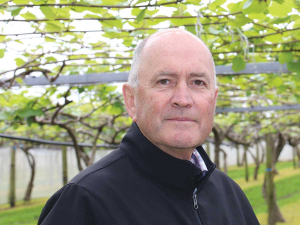Horticulture NZ's annual report for 2020-2021 shows it was a mixed bag for the country's growers.
It says there was growth in the sector and a general sense of rising to last year's challenges. However, this was countered by difficulty in finding skilled labourers, the effects of climate change and uncertainty regarding the future resulting in muted enthusiasm for the coming year.
"The past 12 months will likely go down as the most bizarre and interrupted year in most of our lifetimes," Hort NZ president Barry O'Neil explained.
He says that despite the unprecedented challenges the horticulture sector quickly adapted. O'Neil claims it adopted a more collaborative approach with other growers to growing crops, recruiting talented Kiwis and engaging with government on plan changes - as well as promoting recognition of horticultural land and its importance in feeding the nation.
"Some challenges have been from things out of our control like Covid-19, extreme weather events and shipping disruptions," he added. "But others should have been under our control if the Government supported our need to access Pacific seasonal labour to ensure our crops are picked and packed."
The lack of skilled temp and permanent workers from abroad and the difficulty of getting local Kiwis into taking up these jobs was - along with the international difficulties in shipping the harvested produce - the main source of trouble for the sector. Meanwhile, extreme weather events were more regionalized sources of trouble.
Although the report points to how in the early days of the pandemic, meetings between Hort NZ and the Government was able to keep the horticulture industry sector open. It nevertheless admits that it was unsuccessful in keeping many smaller, independent fruit and veg retailers open during the first lockdown. In subsequent lockdowns these independent retailers where allowed to stay open, however, the initial lockdown still caused a significant drop in business and revenue for said retailers.
O'Neil says that engagement with government through advocacy and industry representatives is key to preserving the gains being made for growers, and preventing losses.
"With such a complex change agenda, not all proposals are aligned, so we end up having to advocate [so] that the left and right hands talk to each other," he says.
"As Queen Elizabeth II once famously said, it was our 'annus horribilis', so let's hope going forward we return to annus mirabilis!"
The report also highlights that despite the challenges, horticulture largely rose to the economic task with an overall New Zealand market value of $6.73 billion. Earning $4.55 billion in exports, up from $4.2 billion in 2019.
Some 83% of surveyed growers also expressed satisfaction in Hort NZ's representation of issues facing growers.
"As an organisation, we are totally committed to working on your behalf to deliver the best possible outcomes for members and for growing in New Zealand," O'Neil added. "We would like to express our thanks to all growers and the wider horticultural sector for their ongoing commitment and passion."


















